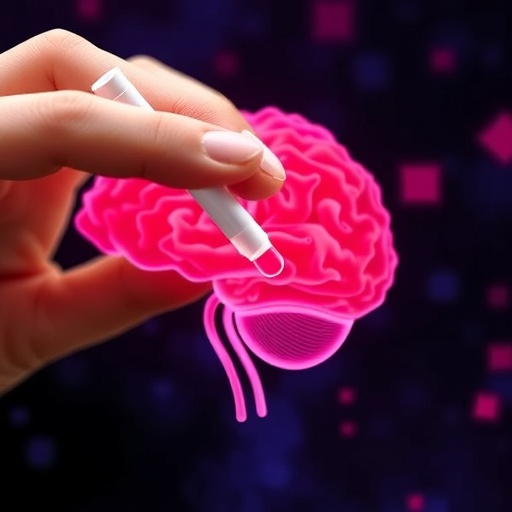In a groundbreaking advancement in the pursuit of early detection methods for Alzheimer’s disease and related dementias, researchers from the University of California San Diego School of Medicine have uncovered a compelling link between self-reported cognitive decline and specific blood-based biomarkers in Hispanic and Latino adults. Published in the prestigious journal JAMA Network Open, this study pioneers a potential pathway toward a blood test that is not only less invasive but also faster and more cost-effective than currently available diagnostic techniques.
Alzheimer’s disease, a progressive neurodegenerative disorder marked by cognitive deterioration and memory loss, poses a significant challenge for early diagnosis, particularly in underserved populations. Current diagnostic standards often rely on neuroimaging or cerebrospinal fluid analysis, which are invasive, expensive, and inaccessible to many. The FDA-approved blood assay currently in use, the Lumipulse G pTau217/Aβ42 plasma ratio, although accurate, remains a specialized and costly option, limiting its widespread utility. This backdrop emphasizes the need for scalable diagnostic alternatives.
The UC San Diego research team leveraged extensive data from the Hispanic Community Health Study/Study of Latinos (HCHS/SOL), the most comprehensive long-term study focusing on Hispanic and Latino health in the United States, to explore the viability of blood biomarkers as indicators of neurodegenerative processes. This particular effort zeroed in on a subset of 5,712 Hispanic and Latino adults aged 50 to 86, making it one of the largest biomarker studies conducted within this demographic.
Subjective cognitive decline, a self-perceived reduction in cognitive capacity such as memory or executive function, was used as a critical clinical endpoint. The researchers assessed concentrations of various proteins in participants’ plasma, focusing on amyloid beta (Aβ42/40), tau proteins, neurofilament light chain (NfL), and glial fibrillary acidic protein (GFAP). These molecules are implicated in neuronal injury, brain inflammation, and hallmark pathological processes in Alzheimer’s disease pathology.
Remarkably, the analysis revealed that elevated plasma levels of NfL and GFAP were associated with higher reports of declines in complex cognitive tasks including planning and overall cognitive performance. Furthermore, increased NfL and phosphorylated tau protein (ptau-181) correlated with self-reported memory impairments. These findings underscore the potential utility of these markers as proxies for neurodegeneration and neuroinflammation reflective of Alzheimer’s pathology.
Contrary to expectations, amyloid-beta levels in blood, a classic pathological hallmark of Alzheimer’s in the brain, did not show a significant relationship with self-reported cognitive decline. This disconnect highlights ongoing challenges in translating amyloid assays from brain-centric pathology to peripheral biomarkers and invites further investigation into the temporal and mechanistic underpinnings of amyloid dynamics in plasma.
One of the study’s most intriguing findings rests on the data from cognitively unimpaired individuals. Even among participants without clinically detectable cognitive deficits, elevated NfL levels were linked to subtle self-perceived cognitive declines, fortifying the hypothesis that NfL could serve as an early sentinel biomarker. This emphasizes a vital potential clinical application: identifying individuals at risk before extensive neuronal damage occurs.
The inclusion of Hispanic and Latino participants fills a critical gap in Alzheimer’s research, addressing a population historically underrepresented despite exhibiting higher prevalence rates and projected increases in dementia incidence. By analyzing biomarker-cognition relationships within this diverse group, the study offers valuable insight into how social determinants of health, genetic predispositions, and comorbidities may modulate disease progression and biomarker expression.
Moreover, this research advocates for blood-based biomarkers as scalable tools capable of extending diagnostic reach beyond specialized centers. The relative simplicity and affordability of blood tests could revolutionize screening strategies, especially in resource-limited and diverse clinical settings. Nonetheless, the authors caution that these biomarkers should complement, rather than replace, existing diagnostic methods until further validation solidifies their clinical utility.
The complexity of Alzheimer’s pathogenesis and heterogeneity in clinical presentation necessitate a multifaceted diagnostic approach. Biomarkers such as NfL and GFAP reflect neuroaxonal damage and gliosis, respectively, capturing critical components of neurodegeneration but may not encompass the full spectrum of pathological features. Integrating biomarker data with cognitive assessments and imaging will remain essential in crafting comprehensive diagnostic frameworks.
Funded in part by grants from the National Institute on Aging and supported through collaborative efforts involving multiple universities, this study exemplifies the power of multi-institutional research endeavors focused on health equity. The inclusion of investigators from University of North Carolina, Wayne State University, San Diego State University, University of Miami, University of Illinois at Chicago, University of Minnesota, and University of California campuses underscores the initiative’s breadth.
While promising, the translation of blood-based biomarker assays into routine clinical practice faces several hurdles including assay standardization, cost reduction, regulatory approval, and integration into clinical decision-making processes. The study’s authors emphasize that ongoing research is crucial to ascertain biomarkers’ predictive validity, especially in diverse populations, and to understand their longitudinal dynamics in relation to cognitive trajectories.
This advancement marks a hopeful step toward democratizing Alzheimer’s diagnostics, potentially enabling earlier interventions that could alter disease course or improve quality of life. By harnessing blood-based biomarker technologies in previously understudied populations, the scientific community moves closer to more inclusive and effective strategies combating the global burden of Alzheimer’s disease.
Subject of Research: Blood-based biomarkers for early detection of Alzheimer’s disease and cognitive decline in Hispanic and Latino adults
Article Title: Not specified in the provided content
News Publication Date: Not specified in the provided content
Web References: https://doi.org/10.1001/jamanetworkopen.2025.31038
Keywords: Alzheimer disease, Cognitive disorders, Blood, Medical diagnosis
Tags: blood test for Alzheimer’s diagnosisblood-based biomarkers for dementiachallenges in Alzheimer’s diagnosiscognitive decline biomarkerscost-effective dementia diagnosticsearly detection of Alzheimer’s diseaseHispanic and Latino health researchinnovative Alzheimer’s researchJAMA Network Open publicationneurodegenerative disorder detectionnon-invasive Alzheimer’s testing methodsUniversity of California San Diego study





